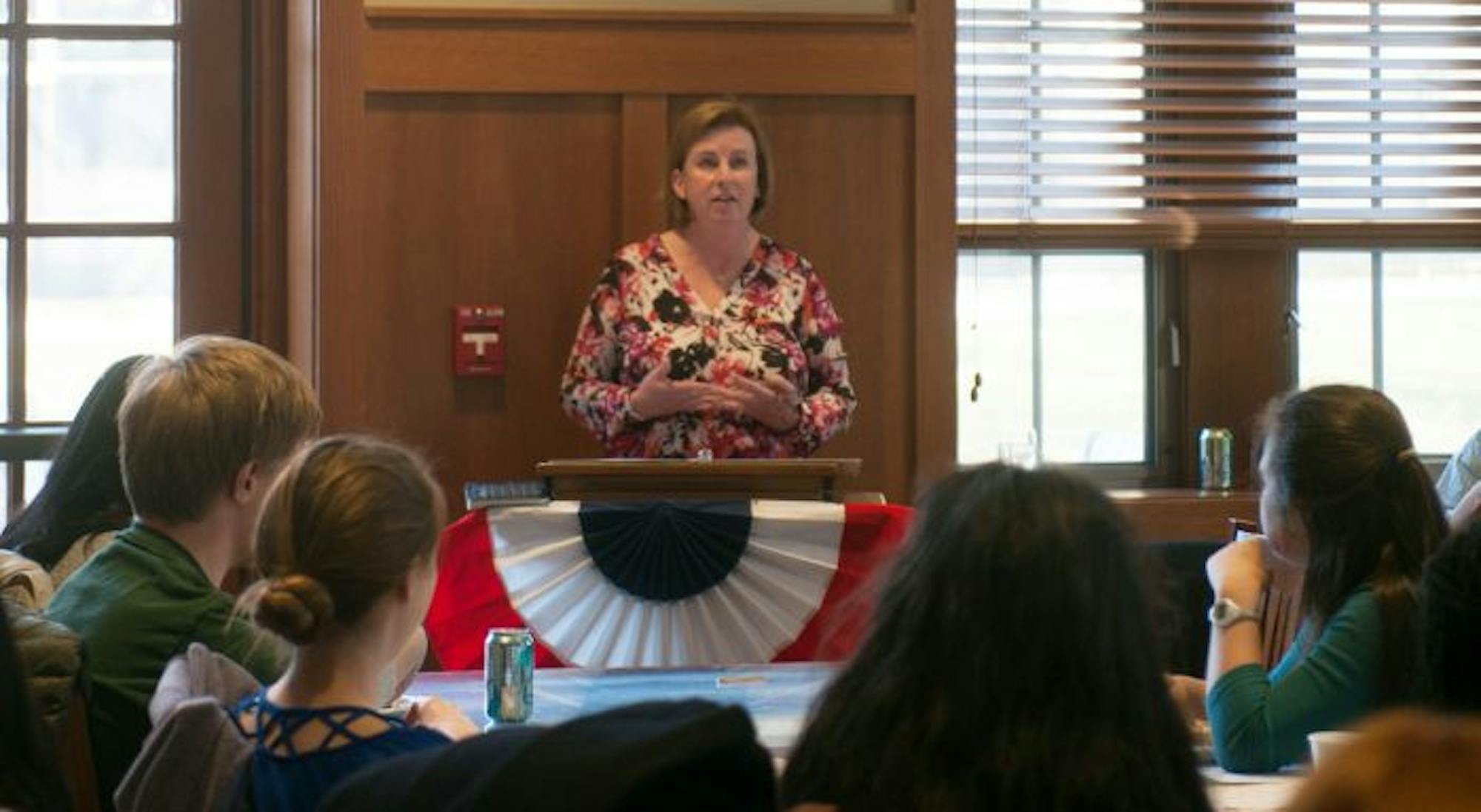A simple hashtag, #MeToo, was the spark that helped light a contemporary social movement, and on Monday members of the Notre Dame community came together in Geddes Hall to discuss the legal and political implications of the #MeToo moment.
The lecture and discussion was part of the NDVotes lecture series “Pizza, Pop & Politics.” Jennifer Mason McAward, associate professor of law and director of the Center for Civil and Human Rights, and Geoff Layman, professor of political science and interim director of the Rooney Center for the Study of American Democracy, led the discussion.
“The ultimate goal is workplace equality and an end to sexual harassment,” McAward said. “The New York Times can’t write an expose about every Harvey Weinstein that’s out there; the question is where do we go from here and how do we capitalize on the moment.”
McAward said culture, the political system and the legal system all require conscious change in order to cultivate an environment of workplace equality.
“How do we make the conduct not just unacceptable but unthinkable?” she said.
McAward said our legal system can be used as a powerful tool to incentivize changes. She said it can help encourage better conduct and deter future harassment.
“One of the key pillars of the ‘Time’s Up’ project is a fund for legal representation for sexual harassment victims,” McAward said. “People understand that the law is a crucial part of the conversation.”
McAward referenced Title VII of the Civil Rights Act of 1964 as a legal mechanism for accountability in sexual harassment cases. She said it states that “no employer shall discriminate on the basis of race, color, religion, sex or national origin in employment job training and recruitment.” She said during the first year Title VII was on the books, a full third of the cases brought to court were in regard to sex discrimination.
“Today about 8,000 sexual harassment claims are filed each year in the [U.S. Equal Employment Opportunity Commission],” she said. “But that number certainly doesn’t capture the scope of the problem. I just read a study that estimates that about 70 percent of people who experience workplace discrimination don’t report it.”
Layman discussed the implications of #MeToo movement for the two political parties.
“I think the first thing that we should recognize is that #MeToo is not occurring in a political vacuum; it’s occurring in a political moment when there is a lot of activism by citizens, particularly by women, that is fueled in part by the frustration over Hillary Clinton, the first major nominee who was a woman, and by [President] Donald Trump’s win and perhaps by the lack of consequences for the charges of sexual misconduct by Trump himself,” he said.
Layman said though he thinks the broad cultural shift the movement has caused is more important than its political implications, it is still important to consider its potential effects on politics. He said Trump has spurred a political awakening in women that has charged their higher levels of political engagement and activism.
“We saw women’s voting and turnout patterns were particularly important in the recent statewide elections in Virginia, the gubernatorial elections which the Democrat won and certainly in Alabama where really there was a very impressive turnout of African American women which was a big reason for Roy Moore’s defeat and Doug Jones’s win,” he said.
Layman said surveys have shown that women are more likely than men to say they have been more engaged in politics after the 2016 election. This trend is especially prevalent in women with postgraduate degrees. He said a record number of women are also running for office, with 79 women considering running for governor in 2018 and four times as many Democratic women running for House of Representative seats compared to Republican women.
“I think it’s important to put this #MeToo movement for its partisan implications in context,” Layman said. “It’s part of this broader movement where women seem to have reacted to the Trump presidency by becoming more interested, more engaged and more active especially on the left side of politics, the liberal side of politics.”
Though the Democratic Party has more strongly identified with the #MeToo movement, Layman said this does not necessarily mean the movement is completely positive for the party and that it could be a double-edged sword.
“This is sort of another issue that appeals to a specific constituency and maybe is not as important to others,” he said. “The white working class would not seem to be as concerned about sexual harassment, about #MeToo, [and] is more concerned about economic conditions. ... Another potential con is it’s more identity politics … trying to piece together a coalition by appealing to small minority groups based on their narrow issues and what it needs to do is again be the party for all Americans.”
Layman said the #MeToo movement has spurred a counter–mobilization among men. This is especially true of conservative men who see Trump as their leader and following his lead in claiming that allegations of sexual assault ignore due process for the accused. He said though it is hard to outline the #MeToo movement’s partisan implications, it is still important to put them in context.
“It could be really good, it could be neutral, it could possibly be even bad,” he said. “The more attention there is to sexual misconduct and the more famous and powerful men that are brought down because of their sexual misconduct that just seems to put more attention onto President Trump’s problems with charges of sexual harassment and misconduct.”
Pizza, Pop and Politics analyzes how the #MeToo movement relates to law and politics
Runjie Pan | The Observer
Law professor Jennifer Mason McAward speaks at a Pizza, Pop and Politics lecture centered on the #MeToo Movement Tuesday. McAward lectured along with political science professor Geoff Layman.









